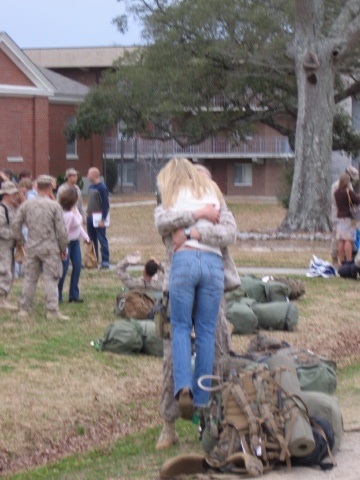
Jamison family
The other day I was sitting in my office when my 3-year-old daughter came running in. She was sobbing, unable to catch her breath or tell me what was wrong. Her face flush, with red circles emanating from her swollen eyes, she was inconsolable. In tow came my wife, somber-faced and also on the verge of tears. “What’s wrong?” I asked. There was no response, just muffled sobs. Frightened, and fearing the worst, as I’m prone to do, I urged them to answer me.
When my daughter finally calmed down enough to speak she pleaded: “Daddy, please don’t ever leave again.”Confused and instantly caught off guard, I was distraught until I glanced down and noticed the picture frame she clutched between her little hands and against her shuddering chest.
In a small silver frame, she held the grainy yet powerful image of the embrace shared between me and my wife, a symbolic moment showing the raw emotion that accompanies a warrior’s return from war. My gear strewn on the ground around us, her legs lifted off the grass as she jumped into my arms.
Our embrace, the moment when we could each finally exhale and thank God for my homecoming from my final deployment to Iraq, is a cherished memory for us both. However, when my daughter saw the same picture for the first time that day, rather than focus on the celebration captured, she instead thought of what could have been. Where we saw closure, she saw separation; where we saw joy, she saw grief; where we saw resolution, she saw uncertainty.
To her, the possibility of her Daddy having to leave again to protect us in a far away place has become all too real. Ever perceptive for a 3-year-old, she has consolidated snippets of television programs, adult interactions, and school conversations to form a remarkably accurate picture of why some daddies have to say goodbye to their families to defend their country in a foreign land.
I am grateful to answer her truthfully: “Sweetie, Daddy doesn’t have to go away any more. Daddy will never leave you.” And yet even as the words come out, I feel the familiar twinge of guilt, knowing that to mothers and fathers still in uniform, speaking the truth about leaving their children isn’t so easy. On the eve of your deployment, for example, how can you possibly reassure a child that you will come home to them when deep down you don’t know whether that’s really the truth?
After our own long embrace, I took a deep breath and exhaled slowly, exhausted by our brief but emotional journey. To my surprise, however, my daughter was not yet satisfied with my answer, and her uncanny knack for asking me unanswerable questions emerged: “Daddy, why did those people want to fly planes into the buildings?”; “Why do some daddies that protect us never come home to their sweeties?”; “If the daddies don’t come home, then where do they go?”
Her questions rang with an innocence that pierced the core of my soul. How was I supposed to answer my daughter’s questions when I struggle, emotionally and spiritually, with the same uncertainties? When my faith is not strong enough to give her comfort, where do I turn? A somber “I don’t know” was thankfully enough to satisfy her curiosity. Maybe she understood that for Daddy, her questions were all too real.
That night, my daughter fell asleep clutching the picture frame close to her chest. Perhaps by keeping the picture nearby, she could keep her Daddy safe…and home. I kissed her goodnight, and with acute compunction whispered: “I love you, and will never leave you. Not ever.”


